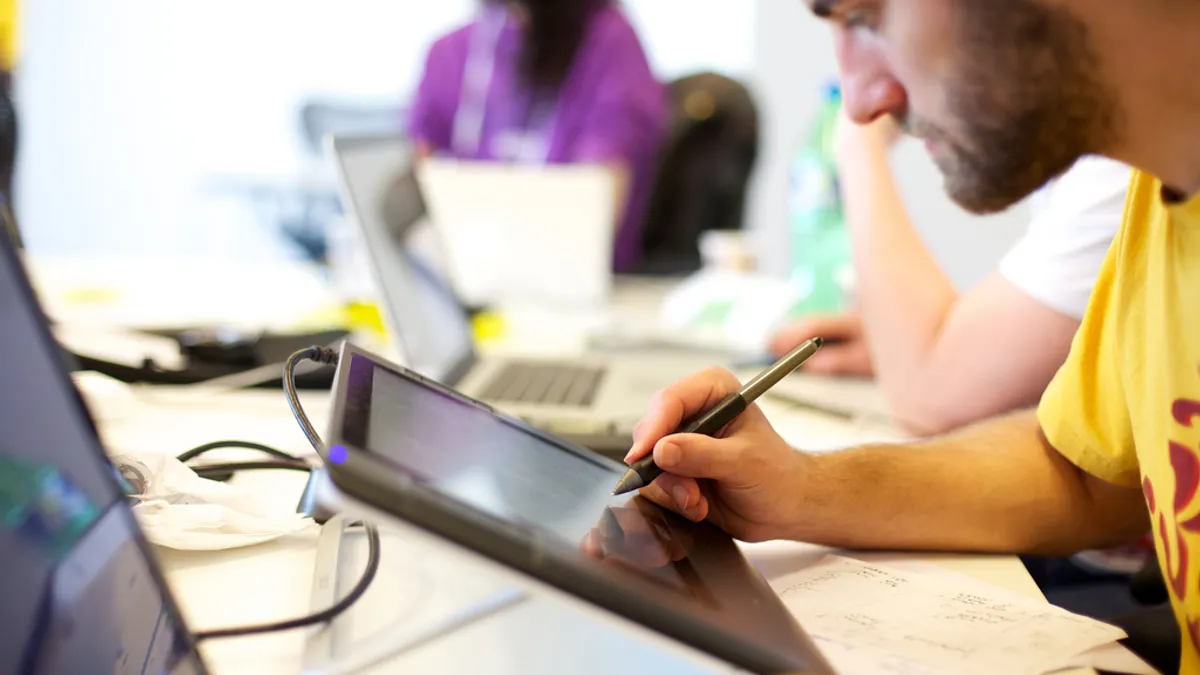The shift from paper to digital resources in higher education has affected virtually all levels of operations, and it is transforming the way students learn and faculty teach — but perhaps not as quickly as some might hope.
An inaugural survey on the state of digital media in higher education by VideoBlocks finds overwhelming support for digital materials by faculty and students. Fully 91% of faculty or administrator respondents said digital media in lectures improves student learning outcomes, and about three-quarters of student respondents said multimedia elements make them more engaged in lectures. But faculty report frustration with levels of institutional support, including for technology resources as well as training.
The VideoBlocks report includes responses from about 150 students and 150 educators across a diverse higher education landscape that makes generalities difficult.
A survey conducted this past fall and winter by the Campus Computing Project, Going Digital: Faculty Perspectives on Digital and OER Course Materials, found considerably less support among faculty for digital materials. Less than half said digital materials provide significant value-added content not available in print, and less than one-third said they have a beneficial impact on student learning compared to print.
The VideoBlocks survey indicates educators are ready to go and institutions are holding them back, while the Campus Computing Project finds more skepticism among faculty. The results may not be entirely in opposition, however. The Campus Computing Project found very high levels of support for digital curricular resources among chief information officers, specifically. In the 2015 survey, 96% of respondents said such resources make learning more efficient and effective.
So how are institutions supporting the shift?
TJ Leonard, CEO of the subscription-based stock footage provider VideoBlocks, sees more support for shiny new buildings than for the materials that make digital content creation possible.
“We’re seeing schools open up pocketbooks for world class facilities but they’re using last-century creative content in these 21st century spaces,” Leonard said.
Notre Dame is one of the universities investing in a new Digital Media Center. It will consolidate digital initiatives and media creation from across campus into a single 2,000-square-foot studio. The facility will open in about 18 months as part of the Campus Crossroads Project.
Elliott Visconsi, Notre Dame’s chief academic digital officer, doesn’t expect the project to fall flat or end with new construction. Already, the Office of Digital Learning is a couple years into offering strategic support for faculty interested in taking content digital. They have teams of creative professionals who can help faculty create digital media, letting them remain the content experts while the creatives handle the technology and software.
Visconsi sees the new center as a commitment by the university to have the facilities necessary to produce great digital content. On the academic side, he says digital media is one of many emerging approaches that enhance instruction.
“We know that we need to support our faculty as they embrace new and emerging pedagogies and the technologies that can really drive effective learning,” Visconsi said.
The Office of Digital Learning is accepting proposals in its latest round of the Digital Publishing Initiative, which offers faculty training on digital publishing platforms and support to create digital course materials with the help of a dedicated team.
Colleges and universities come in many shapes and sizes, but across the small, large, private, public, nonprofit and for-profit sectors, one thing is true: most faculty are pressed for time. Educator respondents to the VideoBlocks survey repeated a lack of time when asked about their frustrations with digital media. If institutions want to support the shift to digital, they have to help faculty fit it in. Whether that is by creating curated libraries of digital resources or offering content creation initiatives like at Notre Dame, success, in many ways, is predicated on strong institutional support.
Would you like to see more education news like this in your inbox on a daily basis? Subscribe to our Education Dive email newsletter! You may also want to read Education Dive's look at how UConn's black male learning community is drawing criticism.










